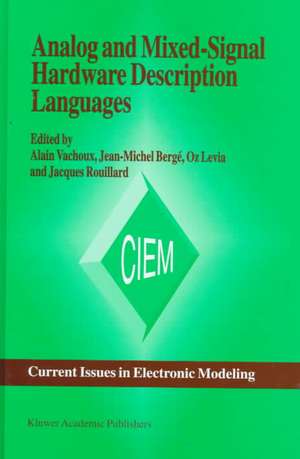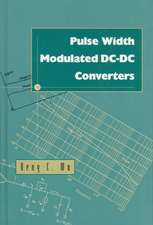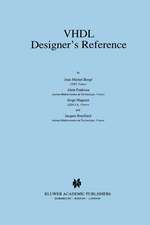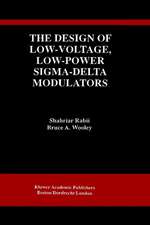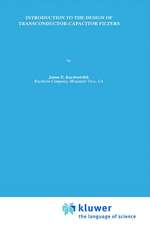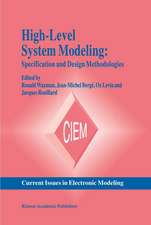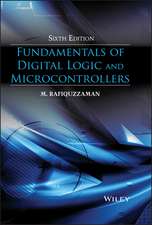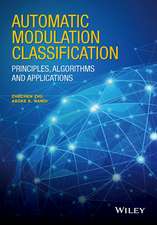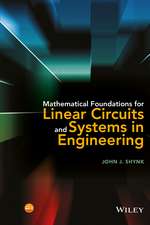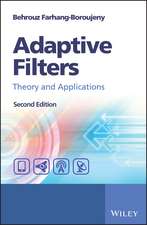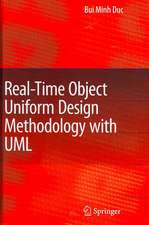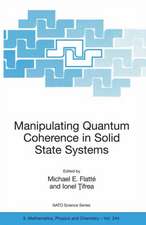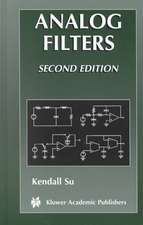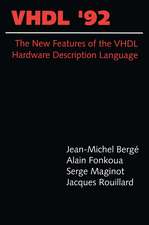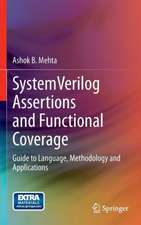Analog and Mixed-Signal Hardware Description Language: Current Issues in Electronic Modeling, cartea 10
Editat de A. Vachoux, Jean-Michel Bergé, Oz Levia, Jacques Rouillarden Limba Engleză Hardback – 31 iul 1997
So far, HDLs have been mainly dealing with digital systems. However, integrated systems designed today require more and more analog parts such as A/D and D/A converters, phase locked loops, current mirrors, etc.
The verification of the complete system therefore asks for the use of a single language. Using VHDL or Verilog to handle analog descriptions is possible, as it is shown in this book, but the real power is coming from true mixed-signal HDLs that integrate discrete and continuous semantics into a unified framework. Analog HDLs (AHDL) are considered here a subset of mixed-signal HDLs as they intend to provide the same level of features as HDLs do but with a scope limited to analog systems, possibly with limited support of discrete semantics.
Analog and Mixed-Signal Hardware Description Languages covers several aspects related to analog and mixed-signal hardware description languages including:
The use of a digital HDL for the description and the simulation of analog systems The emergence of extensions of existing standard HDLs that provide true analog and mixed-signal HDLs.
The use of analog and mixed-signal HDLs for the development of behavioral models of analog (electronic) building blocks (operational amplifier, PLL) and for the design of microsystems that do not only involve electronic parts.
The use of a front-end tool that eases the description task with the help of a graphical paradigm, yet generating AHDL descriptions automatically.
Analog and Mixed-Signal Hardware Description Languages is the first book to show how to use these new hardware description languages in the design of electronic components and systems. It is necessary reading for researchers and designers working in electronic design.
| Toate formatele și edițiile | Preț | Express |
|---|---|---|
| Paperback (1) | 640.05 lei 6-8 săpt. | |
| Springer Us – 26 oct 2012 | 640.05 lei 6-8 săpt. | |
| Hardback (1) | 645.97 lei 6-8 săpt. | |
| Springer Us – 31 iul 1997 | 645.97 lei 6-8 săpt. |
Preț: 645.97 lei
Preț vechi: 807.46 lei
-20% Nou
Puncte Express: 969
Preț estimativ în valută:
123.62€ • 128.59$ • 102.06£
123.62€ • 128.59$ • 102.06£
Carte tipărită la comandă
Livrare economică 12-26 aprilie
Preluare comenzi: 021 569.72.76
Specificații
ISBN-13: 9780792398752
ISBN-10: 0792398750
Pagini: 158
Ilustrații: XX, 158 p.
Dimensiuni: 155 x 235 x 11 mm
Greutate: 0.43 kg
Ediția:1997
Editura: Springer Us
Colecția Springer
Seria Current Issues in Electronic Modeling
Locul publicării:New York, NY, United States
ISBN-10: 0792398750
Pagini: 158
Ilustrații: XX, 158 p.
Dimensiuni: 155 x 235 x 11 mm
Greutate: 0.43 kg
Ediția:1997
Editura: Springer Us
Colecția Springer
Seria Current Issues in Electronic Modeling
Locul publicării:New York, NY, United States
Public țintă
ResearchCuprins
1. Applicability of Discrete Event Hardware Description Languages to the Design and Documentation of Electronic Analog Systems.- 1.1. Introduction.- 1.2. Modeling Basic Analog Concepts.- 1.3. Network-Independent Data-Sampled Analog Systems.- 1.4. Network-Dependent Data-Sampled Analog Systems.- 1.5. Summary.- 2. VHDL 1076.1: Analog and Mixed-Signal Extensions to VHDL.- 2.1. Introduction.- 2.2. Foundations.- 2.3. The 1076.1 Language.- 2.4. Examples.- 2.5. Concluding Remarks.- 3. Analog Extensions to Verilog.- 3.1. Introduction.- 3.2. Natures and Disciplines.- 3.3. Network Models.- 3.3. Verilog-A Features.- 3.4. Multi-Disciplinary Modeling.- 3.5. Summary.- 4. Op3:A Behavioral Generic Model of Operational Amplifiers.- 4.1. Introduction.- 4.2. Description of the Generic Op Amp Model op3.- 4.3. Application Examples of the op3 Model.- 4.4. Conclusions.- 5. Non-Linear State Space Averaged Modeling of A 3-State Digital Phase-Frequency Detector.- 5.1. Introduction.- 5.2. Digital 3-State Phase-Frequency Detector Model.- 5.3. Resettable Integrator.- 5.4. Calibration.- 5.5. DC Convergence and AC Analysis.- 5.6. Sample Application.- 5.7. Switched Voltage Output Stage.- 5.8. Conclusions.- Appendix A: SpectreHDL Model.- Appendix B: Verilog Model.- 6. Behavioural Modelling of Analogue Systems with Absynth.- 6.1. Introduction.- 6.2. Analogue Modelling.- 6.3. Graphical Description.- 6.4. Automatic Code Generation.- 6.5. Results.- 6.6. Conclusions.- 7. VHDL-1076.1 Modeling Examples for Microsystem Simulation.- 7.1. Introduction.- 7.2. Modeling Principles.- 7.3. Conservative Systems.- 7.4. Piecewise Linear Models.- 7.5. Signal Flow Models.- 7.6. Piecewise Defined Behavior.- 7.7. Physical Parameter Extraction from Finite Element Simulations.- 7.8. Simulation Results using HDL-A Models.- 7.9.Conclusions.
